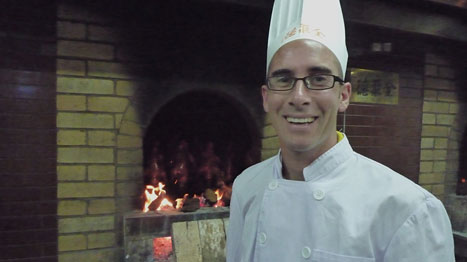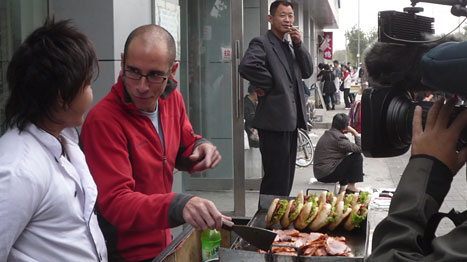But despite all their differences, there's one thing that binds all Chinese people together more than anything else: their passion for food. In fact, meal times are so important here that when Chinese people greet each other they don't say: 'How are you?' They say: 'Have you eaten yet?'
For the traveller this means a trip across China is a journey through the most staggering assortment of lovingly prepared culinary delights imaginable; a taste sensation never to be forgotten.
Peking Duck is the king of all China's dishes. Invented inside the palace walls of Beijing's Forbidden City, it was a dish initially served only to royalty. In fact, it wasn't until an emperor's retired chef decided to open up a public restaurant that the secret recipe escaped, and ordinary folk were able to sample its regal delights. Peking Duck is similar to the crispy duck and pancakes you find on menus in the West, only more care is taken to keep the duck meat from turning dry, resulting in a far juicier and more flavoursome dish. These days roast duck remains relatively exclusive thanks to its hefty price tag, but Beijing's laobaixing (common people) needn't worry; the capital's streets have a wealth of affordable grub too.

The author roasting Peking Duck in Beijing's famous Quanjude Roast Duck Restaurant.
Snack stalls and markets abound, and are perfect for grabbing a quick bite. And it's at these pavement stalls where you can sample some of China's weirdest culinary creations. Head down to Donghuamen Night Market near Wangfujing shopping street, for example, and you'll be able to nibble on delicacies such as sheep-innards broth or barbecued scorpions. If you ask nicely enough, the guys that barbecue the scorpions will even let you eat them live!

The author tries his hand at selling street food in Beijing
If you like your food with a bit of a bite to it, head southwest from Beijing to arrive at the provinces of Sichuan and Chongqing, home to some of the spiciest dishes on the planet. Chillis are used in abundance here along with the unique Sichuan pepper, a mouth-numbing red peppercorn. The signature dish in these parts is hotpot, a super-spicy boiling broth into which fresh raw ingredients are dipped until they are cooked through; a fondue with fire!
Just east from here is Hunan province, the birthplace of Mao Zedong and home to his favourite dish, hongshao rou (braised pork belly). If you thought the Peking Duck was succulent, wait til you try this one. Only the fattiest, juiciest pieces of pork belly are used and they're marinated in caramelised sugar before being cooked very slowly, allowing time for the meat to suck up all the flavours. It's too fatty for some western tastes but it's a dish that is undeniably delicious.
Further south is Guangxi province, famous not only for its stunning, otherworldly limestone peaks, but also for the dog-meat hotpot that's still served in some of its restaurants. If that doesn't sit too well with your morals then try beer fish, a mouth-watering speciality of the village of Yangshuo, but found all over the region.
Southerners mock the northern Chinese for their unrefined dining tastes, but meat eaters will love a foray into Inner Mongolia or the Muslim-dominated northwestern province of Xinjiang, where lamb dominates menus. In fact, so tasty are the lamb kebabs from Xinjiang province that you'll find them on pretty much every street corner of every city in China.